Social proof is used extensively in all forms of marketing both online and offline. It helps you generate sales, boost brand awareness, and improve credibility and authority.
Unfortunately, a lot of businesses don’t use social proof to its fullest potential.
This article explores social proof and how you can use it in marketing to grow your business.
What is Social Proof?
Social proof is a psychological phenomenon that states that people copy other people’s behavior assuming it to be correct. People look at what others are doing when they have to take an action or behave in a certain situation, they aren’t fully aware of. In such situations, people tend to follow others and assume that it’s the right thing to do (as others are doing it).
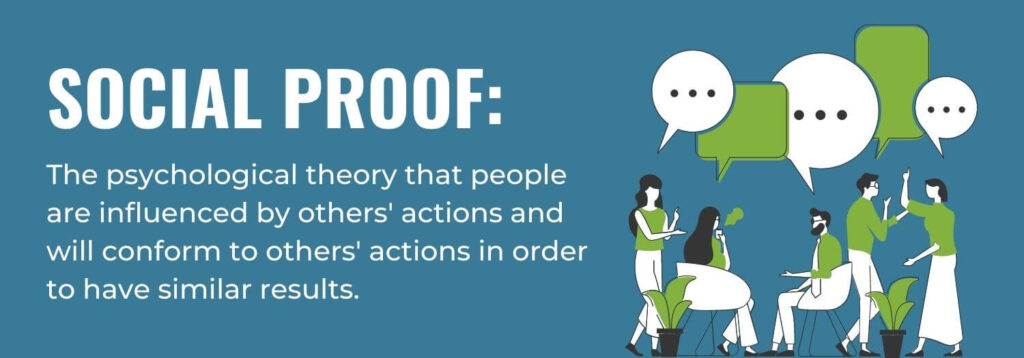
While it doesn’t work exactly the same with everyone as it’s a psychological phenomenon, it’s believed that the majority of people follow other people’s actions in uncertain situations.
For instance, when you see an endorsement of a product by a celebrity, you assume that it’s a great product as the celebrity is more knowledgeable and respected – and you end up buying the product.
Here’s an example of social proof in action:
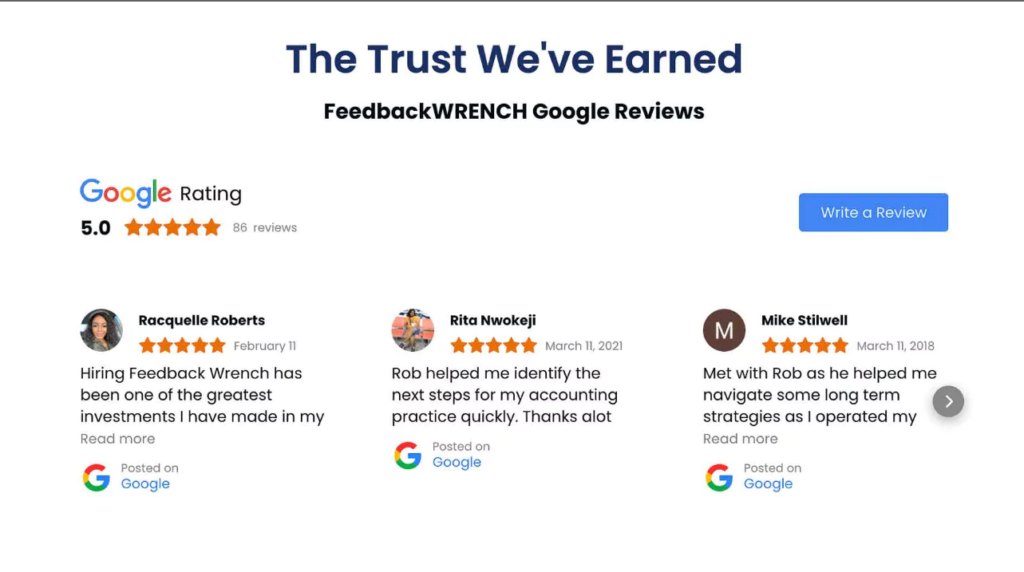
Showcasing Google reviews on your website is one way to persuade website visitors to buy your product. When they see these reviews, they try to mimic their actions to gain similar benefits.
So, what’s so special about social proof, and why is it important for your business?
Here’s why:
- 88% of consumers trust reviews as much as personal recommendations. (OptinMonster)
- 70% of people trust recommendations from unknown people. (OptinMonster)
- 40% of people say that they purchased a product after seeing an influencer they follow using it. (OptinMonster)
- Up to 49% of people rely on X influencers for product recommendations. (OptinMonster)
- Good reviews compel people to spend as much as 31% more. (Wisernotify)
- Adding customer reviews on a website increases its conversion rate by 18%. (Wisernotify)
- Showing UGC on product pages can lift the conversion rate by 166% and reduce cart abandonment by 2.5%. (Wisernotify)
- 75% of marketers say that UGC improves the marketing performance of their campaigns. (SMB Guide)
Types of Social Proof
There are multiple types of social proof used in marketing as listed below:
1. Expert
It’s the most common type of social proof where an expert endorses your product, service, or business. An endorsement from an industry expert makes your product more appealing to the audience and they are more likely to buy.
GetQuip is a toothbrush manufacturer that uses expert endorsements from dentists on its site as social proof. This encourages website visitors that the toothbrushes are high quality as they are recommended by expert dentists:

You can leverage expert social proof in multiple ways:
- Recommendation and endorsement
- Joint venture
- Brand ambassador
- Video ads and TV commercials
- Sponsored posts on social media by an expert.
2. Celebrity
When a celebrity endorses your product, it’s known as celebrity social proof. It’s similar to expert endorsement and works in the same way. In this case, however, you can use a celebrity’s influence as social proof to boost sales and brand awareness.
All those celebrities in TV ads are examples of social proof where people see them as popular icons and end up copying them.
Manuka Doctor used Kourtney Kardashian as social proof when she used one of their products in her reality show and her review was used by the brand to generate sales:

Celebrity endorsements aren’t limited to TV ads, rather they can take any form ranging from a Tweet or a mention of your brand or talking about your product in an interview.
3. Users
Perhaps the best form of social proof is from current users of your product who recommend your product to others organically. For instance, a user talking about your product on social media or sharing a review on Reddit.
Here’s an example:

Users can share their experience anywhere online and offline. All of it is counted as user social proof. Some common channels where your customers can share their experience with your product or business are:
- Social media
- Review sites
- Forums
- Q&A sites
- Email.
4. Certification and Awards
Certificates, awards, and other forms of endorsements from authoritative and well-known organizations build solid social proof.
Here’s an example from Sprout Social where it mentions performance awards on its home page:

A certificate or an award from a relevant authority boosts trust and credibility. Your ideal customers perceive your product to be of high standard when they see such awards.
It’s best to create a dedicated awards and certification page on your website for marketing purposes.
5. Peers and Friends
When people see their friends, peers, relatives, and other acquaintances use a product or engage with a brand online, it compels them to do the same.
This is an organic form of social proof that has a much higher effect than most other types.
Social media platforms leverage this type of social proof where they entice you to sign up to interact with your friends who are already using the same social app.
Here’s an example of how brands use friends and peers’ social proof in marketing:

It’s used in referral programs by businesses to bring more customers at a significantly low cost.
6. Reviews and Testimonials
Customer reviews and testimonials are an important type of social proof that’s used to boost brand awareness, generate sales, and improve business credibility.
A study reported that up to 99.9% of people read online reviews when they are buying something online and the majority of people consider reviews as an important factor in determining business reputation.
Here’s an example of how Keap uses customer reviews to encourage potential customers to take action:
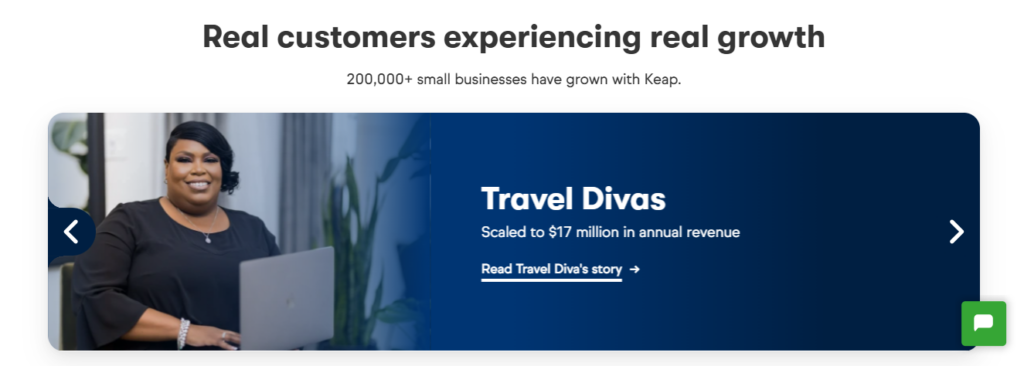
You can showcase reviews and testimonials on your website and leverage third-party review sites like Google, Yelp, and Trustpilot. Social media is another powerful channel to collect and showcase customer reviews and testimonials.
7. Crowd Wisdom
It refers to when people endorse your product, service, or business. When your audience sees a lot of people using your product, they follow the wisdom of the crowd and try to be part of it.
Here’s an example:

Crowd wisdom can be used in multiple ways:
- Highlighting popular product
- Showcasing most-selling item
- Most read blog post
- Number of subscribers
- Number of social media followers
- Customer base.
How to Use Social Proof in Marketing
Here’s a list of the best ways to use social proof in marketing to grow your business:
1. Develop a Social Proof Strategy
Do you have a social proof strategy for your business? Do you have well-defined goals and objectives that you want to achieve with social proof?
If you want to use social proof in marketing, develop a strategy that should include:
- A clearly defined goal
- Types of social proof you’ll prioritize
- Budgeting
- Action plan
- Performance analysis.
For example, you can use social proof to generate sales and you decide to focus on customer reviews and testimonials. You need an action plan that’ll focus on generating reviews. This includes:
- Email templates and phone calls to customers requesting them to share reviews.
- Social media contests for submitting testimonials
- Sending free samples to influencers asking them to share their honest review
- Incentivizing customers in exchange for their testimonials.
You can then track the performance and ROI of your campaign by running A/B tests, tracking, and surveys.
It’s all about your plan.
If you want to get the most from social proof for your business, you must develop a robust strategy.
2. Set a Realistic Budget
Social proof doesn’t work for free.
It might, but you won’t get too far if you haven’t allocated a decent budget.
For instance, experts, celebrities, and influencers won’t recommend or endorse your product for free – no matter how awesome it is. Similarly, awards and certifications don’t come for free. Not all customers leave a review. A study reported that 74% of customers leave a review:
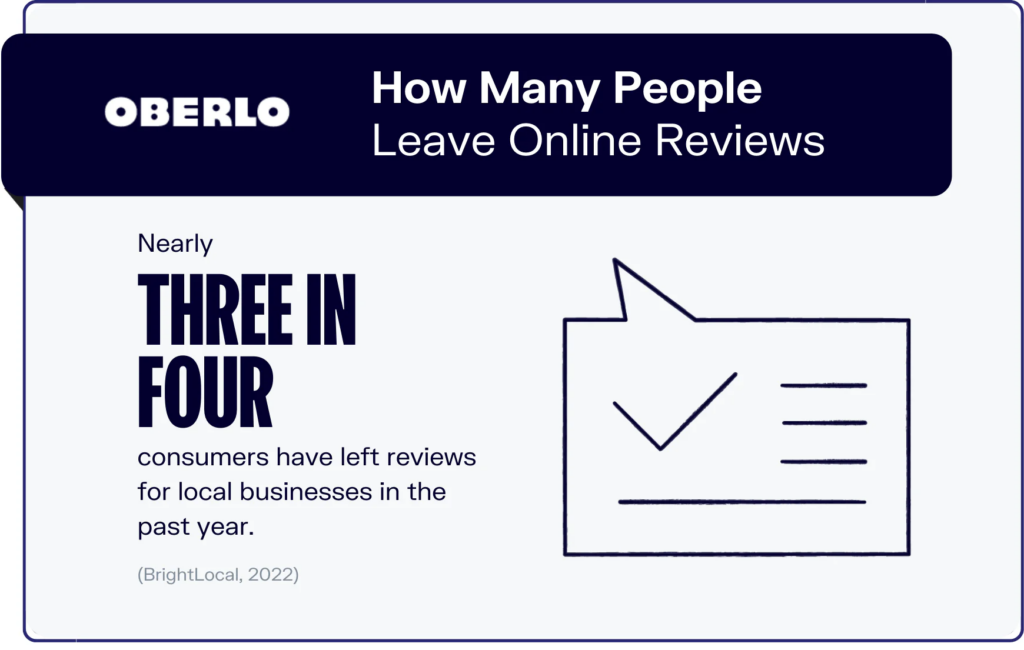
In most cases, you have to reach out to customers and offer them an incentive (e.g., a discount or a gift card) in exchange for their review.
Customers usually don’t leave a review unless they are very happy or very angry with your product or brand. So, you need to reach out to your customers and request them to share their reviews. This requires resources and a dedicated team.

Customer reviews and crowd wisdom are the two cheapest social proof types while endorsements from experts and celebrities and awards are the more expensive.
If you haven’t allocated a decent budget to social proof, don’t expect much.
Start with reviews and testimonials as they are easiest to get. Once you start seeing results, switch to other forms. If you are already running influencer marketing campaigns, set a reasonable budget for social proof in your campaigns.
What’s a realistic and reasonable social proof budget?
It depends on multiple factors:
- Business type, niche, age, and revenue
- Marketing and social proof goals
- Type of social proof you are targeting.
If you want to collaborate with an industry expert, you’ll need a hefty budget to do it. On the other hand, if you work with micro or nano influencers, you can do so in under $500 easily. Customer reviews and testimonials don’t cost a lot and can be managed easily for under $1,000.
It boils down to your requirements.
3. Collaborate with Influencers
One of the best forms of social proof is collaboration with influencers (or micro-influencers). It covers both expert and celebrity types.
Yes, influencer marketing can get expensive as top-tier influencers charge a lot of money. You need to find nano and micro-influencers who charge significantly low (under $1,000 per campaign):

These micro and nano influencers have a highly engaged audience. They are considered celebrities within a specific niche and their followers take their recommendations quite seriously.
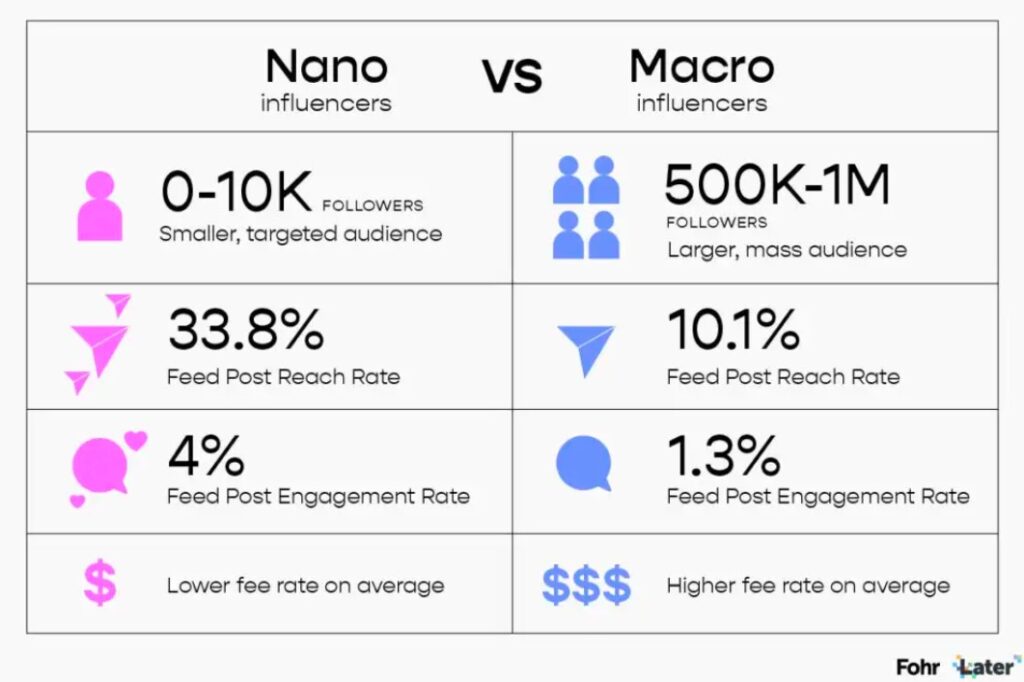
Here’s an example of a sponsored post by an influencer:

The post received 1,404 likes in one day with several comments.
You need to ensure that the influencer endorses or recommends your product in a natural way. If it’s a sponsored post, it might not work great as social proof.
Another benefit of dealing with micro and/or nano influencers is that their posts have high engagement which creates crowd wisdom. When non-followers see a post with numerous comments and likes, they are more likely to give a try to your product or follow your business for more details.
The hard part is finding the right influencers. Read this guide on influencer marketing checklist for more details on how to do it right.
4. Share Business Milestones
Do you share milestones with your audience on your website and social media accounts?
You should do it as it is an important form of social proof. Milestones showcase business expertise and are perceived as awards.
For instance, getting 100K followers on your Facebook Page is a milestone that helps you showcase the wisdom of the crowd. Sharing this milestone on your website will persuade non-followers to follow your page as they’ll consider it to be the right thing to do.
Here are some milestones you should consider sharing with your audience:
- Business anniversary
- Reaching a certain number of customers
- X number of followers
- Business partnerships
- MOUs
- Certifications
- New hires
- New office
- Product launch
- Feature update.
Anything and everything that you consider a business milestone should be shared with the audience across touchpoints.
5. Create User-Generated Content Strategy
User-generated content (UGC) is the content created and published by customers or users without any intervention from your brand. It is the best form of crowd wisdom that works exceptionally well in terms of boosting brand awareness, referral sales, and free content.
Your customers can create content on a wide range of channels including:
- Social media
- Forums
- Quora, Reddit, and similar sites
- Conferences
- Reviews and testimonials
- Case studies.
You need to find UGC content and reshare it to your social media account or your website. Sephora, for example, has a dedicated community gallery section where it showcases UGC:
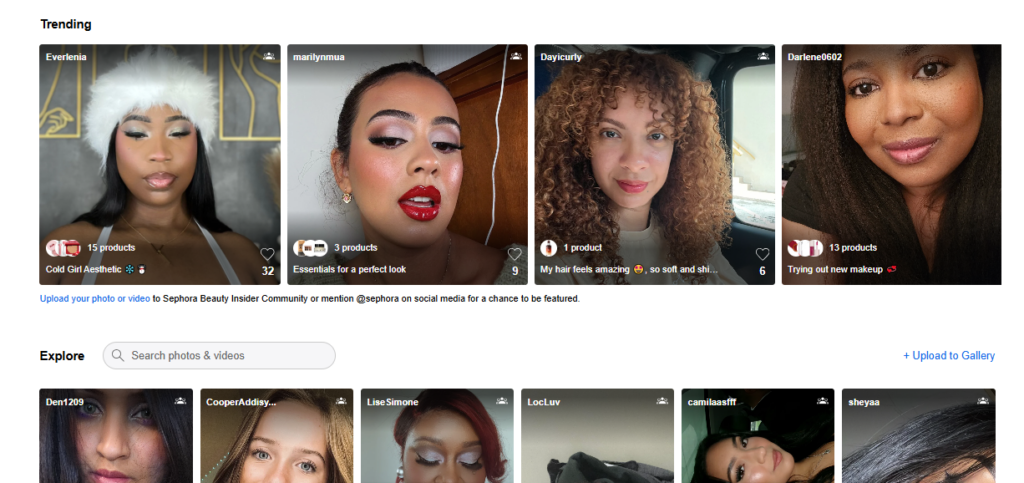
Customers usually don’t create content. You need to develop a UGC strategy for your company to leverage social proof. Here’s how to get started with your strategy for UGC:
- Reach out to customers
- Offer them incentives in exchange for their content
- Actively search the internet and social media sites to find UGC
- Republish and share UGC on your social media accounts and website as social proof.
6. Setup Accounts on Review Sites
Creating accounts on review sites like Google and Yelp is an important part of the social proof strategy. Research shows that users spend the most time on Google, Facebook, and Yelp to read reviews:

Reviews on third-party platforms are more trustworthy than testimonials published on your business website. It’s because the percentage of fake reviews on these sites is quite low.
Here’s a list of review platforms where you should create an account to capture reviews:
- Yelp
- Bing
- Trustpilot
- Yellow Pages
- Better Business Bureau
- Niche review sites based on your industry (such as G2 for software companies and Tripadvisor for hotels and restaurants).
You need to make sure that whenever and wherever a customer wants to submit a review of your product or service, your business must be there. Testimonials aren’t easy to get. Don’t lose customers who are willing to share their reviews just because you don’t have an account on a review site.
Be where your customers are.
7. Start a Brand Ambassador Program
A brand ambassador program focuses on satisfied customers who are loyal to your brand. These brand ambassadors promote your product and brand by following the tasks you assign to them. In exchange, brand ambassadors are rewarded based on their level of activity.
GoPro uses this technique where it asks its customers to share their content created with GoPro using specific hashtags. Here’s an example:

It has helped GoPro develop a community of loyal customers who love using their products.
Since your customers promote your product and engage with your brand, it develops trust, boosts brand awareness, and creates authentic social proof.
Big brands usually have an existing fan base so they don’t have to do a lot of extra work to create a formal brand ambassador program. You have to create one.
Here’s how to develop your brand ambassador program:
- Define program goals
- Set clear criteria for brand ambassadors
- Define program policies and guidelines
- Reach out to existing customers and recruit ambassadors
- Assign tasks and set rewards
- Track progress and tweak your program as needed.
A brand ambassador program offers you a cost-effective way to use social proof in marketing. You only have to connect with existing loyal customers and that’s all.
8. Get Verified on Social Media
A quick and effective way to showcase awards and milestones to boost social proof is by getting verified on social media platforms.
Verification is a way to confirm the authenticity of a social media account user. Accounts that have been verified show a badge or sign indicating that the business or person is authentic.
Here’s an example of a verified account at X:

Leading social platforms including Facebook, Instagram, TikTok, X, and LinkedIn support verification badges that you can apply for if you meet their criterion. You can get it with or without a subscription fee depending on the social media app.
Having a verified badge with your business social media accounts boosts its credibility and authenticity, and is a way to enforce social proof. People who see a verified badge consider it as a milestone that persuades them to follow your account.
9. Collaborate with a Celebrity
It’s an expensive option for establishing social proof but it offers tons of long-term growth opportunities. You can collaborate with a leading celebrity in your industry to drive engagement, sales, and grow your business.
Fashion Nova, for example, collaborated with Cardi B and promoted their products on her Instagram account:
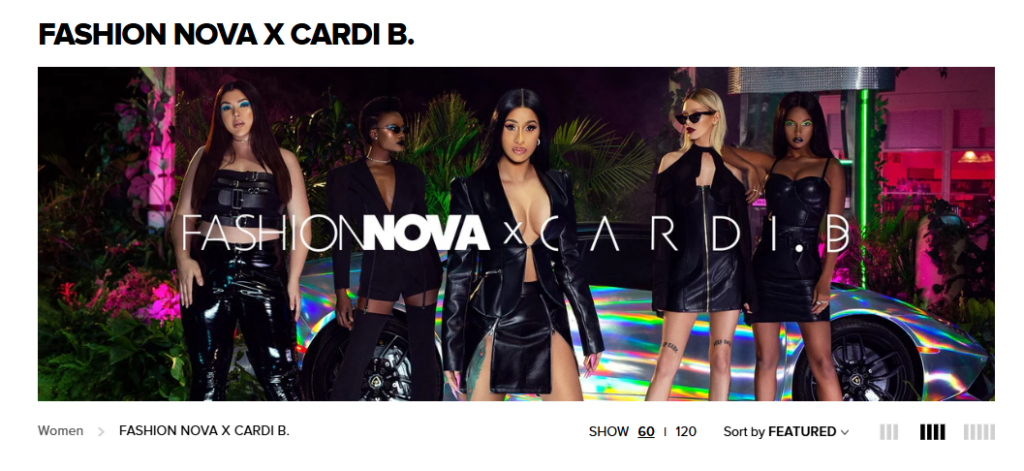
The collab has ended and you might not see any videos on her Instagram account but one of her videos received well over 8.5 million views. The brand, on the other hand, launched an exclusive collection for Cardi B fans that included more than 80 pieces.
These types of collaborations are expensive but are win-win.
And these are very popular among brands and celebs.
If you have the budget to collaborate with a top celebrity, go for it. A collab of this type is often much more than a one-time post or recommendation, rather it is more of a partnership with clearly defined terms and goals.
As a brand, you can reach a new audience and grow your brand’s social proof which will help you for the years to come.
10. Create a Referral Program
A referral program is a perfect way to generate social proof using word of mouth, crowd wisdom, reviews, recommendations, and endorsements. You incentivize your customers to bring in new customers by referring your products to their family and friends.
Here’s how it works:

A referral program is different from a brand ambassador program in the sense that it involves incentivizing your customers to bring in new customers irrespective of their loyalty to your brand. They don’t have to complete a series of tasks and they are usually not brand advocates.
A brand ambassador program is highly specific and restricted to a few top customers, while a referral program has a broader reach as it’s available for everyone to join.
Here’s an example of a referral program:

When your customers share a referral link with their acquaintances, it generates social proof. Up to 92% of people trust referrals from friends more than any other form of advertisement. These are considered personal endorsements that positively impact your business reputation and credibility.
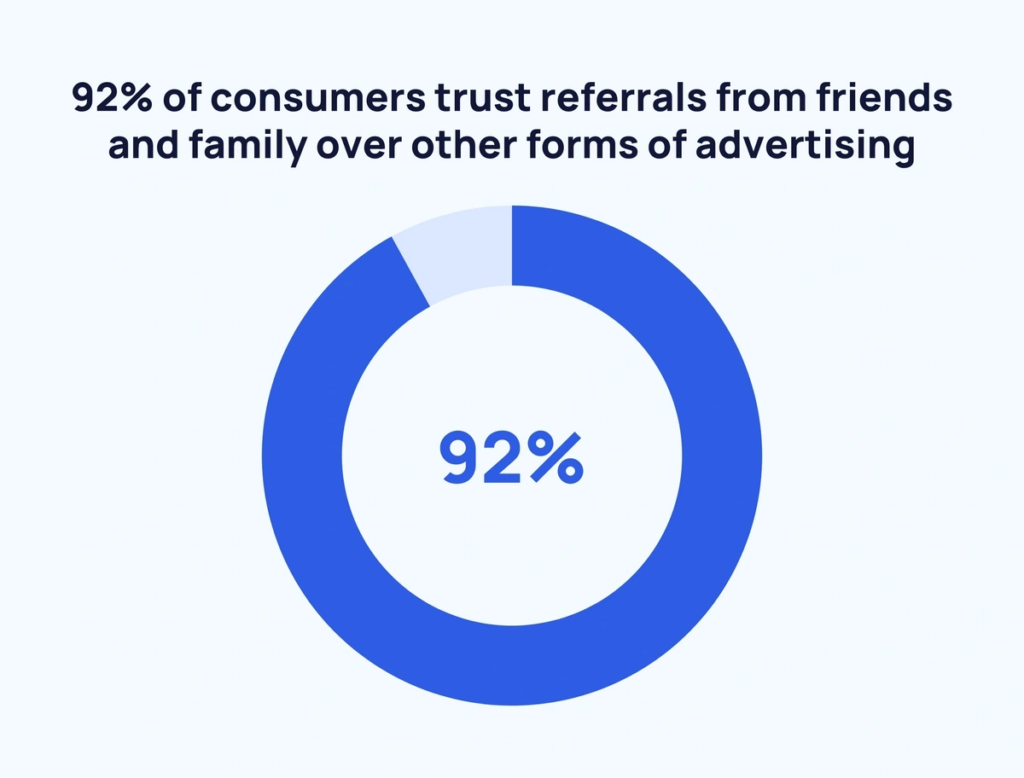
Follow these steps to develop a referral program for your company:
- Define goals and set a budget for your referral program
- Identify incentives and program structure
- Promote your program to existing customers
- Track performance and tweak.
You can use referral marketing software like ReferralCandy, Referral Factory, or Affise to create, launch, and manage your referral program.
Final Words
Social proof is vital for your marketing strategy and business growth. It might sound complicated to manage, but once you get a hold of it and see outcomes – there’s no turning back.
You don’t have to use all the forms of social proof for marketing, choose 1-2 types and master them.
Awards, certifications, reviews, and testimonials are the easiest ones to begin with. They require minimum effort and the results can be seen fairly quickly.
Social proof management should be a continuous process. You need to embed it into your marketing strategy for best, sustainable, and long-term results.
Featured Image: Pexels



